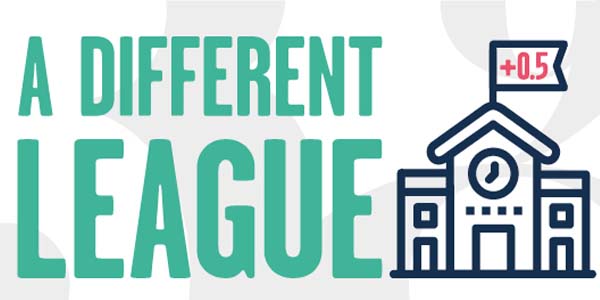A different league

With a new system in place for rating schools, we take a look at how parents should interpret league tables and find how you should really go about finding the right school.
Christine Toner reports.
This month, thousands of pupils will have started senior schools up and down the country. Impeccably dressed in their new uniforms and ready to embark on the next stage of their education, their first day will be the culmination of months, if not years, of planning and research by their parents. Choosing a secondary school for your children is arguably one of the most difficult decisions for parents to make. Secondary school is the stepping stone to university and employment and what happens during the five of senior school can shape a child’s development considerably.
One of the most obvious ways of comparing schools when making the decision is by checking league tables. Of course, while these tables can be a good place to start, they can also leave parents a little bewildered.
Writing in The Telegraph in 2016, Peter Green – headteacher of Rugby School – said: “I don’t suggest that parents are confused by league tables, but I do think that league tables send parents confusing messages. League tables are simply statistics. And we all know how many ways statistics can be presented and interpreted and, dare I say it, manipulated.” That’s even more so the case since Progress 8, a new way of ranking schools, was introduced in 2016.
Progress 8 measures the progress of pupils across a selected set of eight subjects, so that pupils’ results are compared to the achievements of other pupils with the same prior attainment.
The system assesses results achieved in English, sciences, maths, modern foreign languages and history or geography, along with a maximum of three other approved academic or vocational qualifications.
The new approach claims to be a fairer way of comparing schools. Many parents, however, don’t actually know what it is.
A survey published by the Department for Education (DfE) suggests parents are not yet fully aware of how the system has changed with only 30% of the of 1,735 parents polled saying that they had heard of it.
“I suspect many parents find the performance tables pretty baffling and will look chiefly at the rank order rather than the methodology,” says Geoff Barton, general secretary at the Association of School and College Leaders. “In reality, whilst Progress 8 is probably the best of the many measures we’ve seen over the years, it has its limitations. That’s why schools in certain contexts – for example serving disadvantaged communities – will rightly feel that Progress 8 doesn’t help them to celebrate success.”
Stephen Brierley, principal of St Margaret’s Academy in Aigburth is sceptical about the need for such tables.
“Schools are amazing places”, he says. “Every school I’ve ever been to has been a real hive of activity. In every school, every day, hundreds of young people will be learning, trying things out, making friends, doing all the things that youngsters do. And every day, dozens of adults will be giving their all to help them learn and grow. A lot of what we adults do has nothing to do with learning – some of us make them lunch; some of us give them First Aid when they need it; some of us counsel them when life at home is tough; all of us try to help them grow into responsible adults equipped with values that will last them a lifetime; oh, and some of us teach them to read, or to add, or to talk in French.
“For some reason, over the last 25 years politicians have tried to sum up how good each school is with a number. Just one number, like +0.44 or –0.06. It’s a bit silly really: when schools are such rich places with so much going on, how can you possibly sum up how good they are in a single number? It shouldn’t be any surprise that over the years, we’ve had to change how that number is calculated several times. Progress 8 is just the latest way politicians have set for measuring secondary schools. Personally, I don’t think it’s a very easy number to get your head round. Doubtless some parents will understand it whilst some others may not.”
Stephen says that while the new system does have some advantages over its predecessors, one of its disadvantages is that it’s harder to understand. “The way it’s calculated means that schools with a traditional curriculum – where every pupil has to take a foreign language to GCSE, for example – will be at a slight advantage,” he says. “That’s meant that schools have adjusted what subjects they offer at GCSE to fit in with the Progress 8 calculations, and as a result entries in subjects like Design Technology, Food, and Performing Arts have dropped again this year. I don’t think it’s right that one number in our ‘Performance Tables’ should be having such an effect on what schools offer.”
Indeed, research by the Education Policy Institute shows the proportion of pupils studying arts subjects such as music and drama has fallen to its lowest level in a decade. Whether the new system is better or worst than previous systems, there remains an element of doubt amongst many experts as to the validity of league tables altogether.
Indeed, in their 2017 research work ‘The evolution of school league tables in England 1992-2016, Dr George Leckie and Harvey Goldstein noted: “All these progress measures and school league tables more generally should be viewed with far more scepticism and interpreted far more cautiously than they have often been to date.”
So in what other ways should parents be assessing a school’s performance? “Good question,” says Stephen. “Really, there’s only so much parents can find out from the internet. Much the best way of finding out what a school is like it to go there in person. Every school has an Open Evening, and if parents can’t make that particular evening then school leaders will always be willing to show people around during the day when the school is in action (arguably a better way of finding out what really goes on!).
“I’d advise parents to meet the Headteacher, her/his team, some of the teachers there: would parents trust them to look after their child, and to help shape them into the adults they will become? What about the school’s values? Do the staff just pay lip-service to them, or do those values actually help shape what goes on in school every day? If parents can take someone else to look round too – a grandparent, perhaps – that’s no bad thing: four eyes will notice more than two, and there can be a good chat afterwards about what was seen, what was heard, what was felt.” Geoff says one of the most important things to consider is the ethos of the school.
“What are its values and priorities?” he says. “Does it celebrate the full range of pupils’ abilities? Does it have a rich programme of extra-curricular activities, such as the arts and sport? Does it encourage pupils to get involved in fundraising and charity work? Does it give a commitment to developing the whole-child (not just academic results) and supporting the mental health of all children?”
Indeed, academic results are just one element of school life. And the right school for your child should deliver on a number of levels. “One thing that Progress 8 does show is that across, say, 10 GCSEs, there’s not a lot of difference between pupils’ academic progress at different schools”
says Stephen. “If School A has a Progress 8 score of +0.10, and School B has a score of –0.20, then that means that across all a Year 11’s GCSEs, seven will be identical, and three will be just one grade higher at School A. That’s unlikely to make that much difference to the long-term future of that Year 11 pupil.
“What will make more of a difference is the confidence they’ve developed, the responsibilities they’ve been given, the friends they’ve made, the opportunities they’ve had to try new things, or visit new places, or think about new ideas… that’s what a truly good school will offer. It’s that sort of thing, far more than a narrow, unrepresentative number like Progress 8, that parents would be well-advised to consider when looking at secondary schools.”


